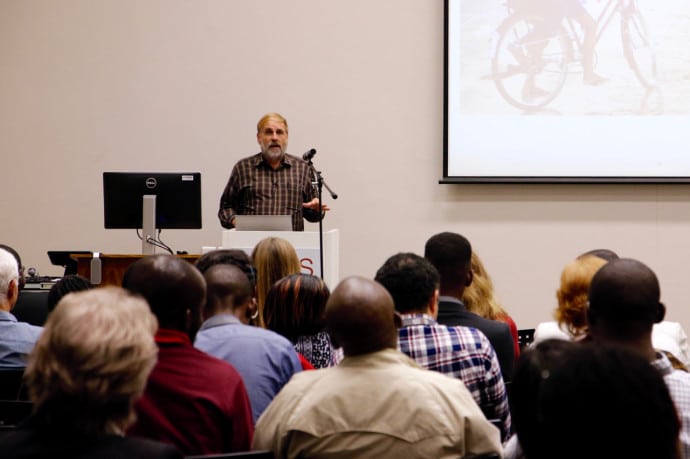STIAS was delighted to host the African launch of the 2017 Report of The Lancet Countdown on Health and Climate Change: From 25 years of inaction to a global transformation for public health. The annual reports track progress in health and climate change in the run-up to the 2030 Sustainable Development Goal targets.

The global launch of the report was held in London and followed by regional launches around the world. STIAS fellow and one of the report’s authors, Prof. Peter Byass of the Department of Public Health and Clinical Medicine at Umeå University presented the main findings of the report at the African launch on 21 November.
The Countdown monitors the relationships between human health and climate change, and their implications for governments’ commitments under the Paris Climate Agreement. It follows on from the work of the 2015 Lancet Commission, which concluded that anthropogenic climate change threatens to undermine the last 50 years of gains in public health, and conversely, that a comprehensive response to climate change could be “the greatest global health opportunity of the 21st century”.
The report is the work of a global, independent research collaboration consisting of 24 partner institutes.
The 2017 report highlights that the last 25 years in global health have achieved remarkable success in improving health around the world but that “climate change threatens to undermine this progress”, said Byass.
“Data to 2015 show that mortality is falling everywhere in the world and that there is increased life expectancy – that’s good news.”
“However, climate change threatens this progress,’ he continued. “Also the situation is not equal. The most vulnerable will notice the effects on health sooner rather than later. The risk is not equitable and the information is not necessarily reaching the people who need it most. Better organised societies are more resilient to the forces of nature.”
Byass focused on local data from the Agincourt research site in the Mpumalanga province in South Africa which is not in the report. “This shows that the increase in temperature is associated with an increase in malaria deaths. This is one example of significant changes over a long time period in a large population.”
Climate-sensitive infectious diseases generally are likely to increase and to appear in parts of the world where they haven’t been found before. “Dengue mosquitoes are colonising new areas of the world – the vectorial capacity for the transmission of dengue has increased by 9.4% (Aedes aegypti) and 11.1% (Aedes albopictus) due to climate trends since the 1950s.”
He also highlighted a very direct example of the health-related effects of climate change: “Nearly 2 million people died of air pollution in South East Asia in 2015 – with the highest rates in North Korea”.
Byass also pointed to the challenges. “It’s hard to make sense of the different timescales and their effects on health and wellbeing. There are slow, cumulative, long-term effects as well as immediate crisis events – like the hurricanes currently. Events that happened maybe once a century are now happening a lot more often, with severe consequences.”
“Also some of the effects may be beneficial in different parts of the world – for example, warmer temperatures in Northern Europe.”
But it’s not all doom and gloom and the report focuses on some good news, including:
- Employment in the renewables sector now outnumbers employment in fossil fuels. In 2016, global employment in renewable energy reached 9.8 million, with employment in fossil fuel extraction trending down to 8.6 million.
- The global value of funds committed to divestment in fossil fuels in 2016 was $1.24 trillion, of which health institutions represent $2.4 billion.
- 30 out of 40 responding countries have a national health adaptation plan or strategy on health and climate approved by the national health authority.
- 73% of the 100 WHO Member States responding to the World Meteorological Organization Survey, report providing climate information to the health sector in their country.
- The total primary energy supply of coal peaked in 2013 and has been rapidly declining since then. Between 2016 and 2017, the amount of additional coal capacity planned for construction, halved.
The main thing is that there is a shift in emphasis. “Health used to be way down on the climate change agenda,” said Byass, “there has now been a big shift.”
The key messages of the report highlight that shift:
- “The human symptoms of climate change are unequivocal and potentially irreversible – affecting the health of populations around the world, today. Whilst these effects will disproportionately impact the most vulnerable in society, every community will be affected.”
- “The delayed response to climate change over the past two decades has jeopardised human life and livelihoods.”
- “Although progress has been historically slow, the past 5 years have seen an accelerated response, and in 2017 momentum is building across a number of sectors; the direction of travel is set, with clear and unprecedented opportunities for public health.”
The report is structured around five key themes: climate change impacts, exposures and vulnerabilities; adaptation planning and resilience for health; mitigation actions and health co-benefits; finance and economics; and public and political engagement.
“The title of the report is deliberately controversial and edgy,” said Byass. “There has been an awful lot of unhelpful inaction. We could do much better if we could turn the clock back.”
“There have been unacceptable delays,” he continued, “due to the lack of political will – but there are recent signs of progress. A significant number of countries are taking it seriously.”
Access the full report at http://www.lancetcountdown.org/
Michelle Galloway: Part-time media officer at STIAS
Photographs: Christoff Pauw
